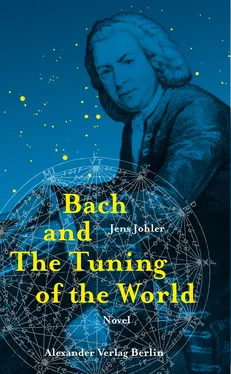1 ...7 8 9 11 12 13 ...16 ‘Yes,’ said Bach. ‘I’m ready.’
‘The first was Pythagoras, the great philosopher and mathematician of Greek antiquity, founder of a religious community and the forefather of all our musical knowledge. He not only discovered the mathematical proportions of chords but also their relation to the harmony of the cosmos.’
The harmony of the cosmos? Bach remembered how Erdmann had told him of Isaac Newton and the law of gravity, and the sudden enthusiasm that had seized him at the time. So gravity ruled over the heavens and on earth – and the same is true for the laws of harmony?
‘Absolutely,’ said Böhm. ‘Pythagoras had the inspirational idea that the harmonic relations he had studied on the monochord could also be found in the heavens. In the harmony of the spheres. He discovered that the cosmos sings.’
‘The cosmos sings,’ repeated Bach.
‘And it is reported that Pythagoras was the only mortal who could hear this music.’
Böhm paused, went to the harpsichord and, with his right hand, played a strange succession of notes that mainly consisted of fifths. With his left hand, he added a single low note now and then, like a pulse beat or a distant drum that seemed to come closer due to the same repetition, defining more and more the pulse of the listener, touching his innermost soul and transporting him to a different state of mind. To Bach, it almost seemed as if he had been transported to a different time, a different century; and as though he, too, were now able to hear the cosmos sing. Finally, Böhm made the strange melody fade away by striking a high G three times in quick succession and then, after a pause, for a fourth time.
Bach did not ask whence the melody came. Had it been handed down by Pythagoras? But how could this be possible? Musical notation has only been with us for a couple of hundred years. Nobody knew how music sounded at the time of Pythagoras.
‘And the other two men of this triumvirate?’ Bach asked, after they both had remained silent for some time.
‘The second,’ Böhm replied, ‘was a Roman patrician called Boethius. He lived a thousand years after Pythagoras, around the year 500 of Our Lord. Boethius wrote a philosophical work with the title De institutione musica , the decisive point of which was the discovery of the three musics I spoke of earlier: musica mundana, musica humana , and musica instrumentalis . Pythagoras had recognized the connection between the music of instruments and the music of the spheres. Boethius added a third dimension: the music of the spirit and the soul, the musica humana . On all three levels, harmony should rule, in the cosmos and on earth, on our instruments and in our soul; and not only in our soul, but in all our human institutions such as the Church and the State, in the family and at work. And that, Bach, is the task of a true musician: that he may bring the harmony of our instruments in accord with the harmony of our mind and soul, such that the harmony of the mind and the soul will chime with the harmony of the cosmos. Musica instrumentalis, musica humana , and musica mundana : All becomes One. Because where there is Oneness, there is God.’
During his speech, the Master had been walking up and down with measured steps. Now he stopped.
Bach expected Böhm to sit down again at the harpsichord in order to improvise a melody, an imitation of the harmony of the spheres perhaps, something weird, unearthly, strange like before. But Böhm just stood there as though he’d been touched with a magic wand and frozen forever in this posture: head tilted to one side, eyes directed upwards to the right, right hand held still halfway in the air, with a slightly outstretched forefinger as if he were listening and at the same time pointing to the sounds he was hearing.
Bach didn’t move either, out of respect and reverence for his teacher. He sat there patiently, and waited; except that, after some time, all sorts of places on his body started to itch, and he wanted to scratch his nose, his knee, his head. He was tempted to cough, or murmur an excuse, but didn’t dare to. Finally, a little shudder went through Böhm. Surprised, he looked to Bach and angrily barked at him. ‘So you’re still here, are you? What do you want? The lesson’s over! Get back to school immediately. Out with you!’
On the way home, in the evening, at night, and over the following days, Bach incessantly mused over who the third in the triad might be. Pythagoras – Boethius – and …? He had a hunch, but wasn’t certain. He wondered if he should talk to Erdmann about it, but for now he wanted to keep to himself Böhm’s words, which had deeply moved him, to let them unfold in his mind and soul without immediately philosophizing about them. All the more impatiently did he long for the next lesson.
What made the wait a little easier for him was that his assistance was twice requested by Thomas de la Selle, Dancing Master to the Nobility. His duties allowed, or obliged, him to accompany the dances of the aristocratic students – their minuets and sarabandes, allemandes and gigues, chaconnes and passacaglias. And Master Thomas de la Selle, a pupil of the great Lully, satisfied with Bach’s playing, praised him, eventually paying him a small retainer.
His next lesson with Böhm at last approached, once again at St John’s Church. After they’d been sitting at the organ for some time, and had busied themselves with playing some choral fantasies, Bach could no longer restrain himself.
‘Who was the third?’ he asked.
‘The third?’
‘Pythagoras – Boethius – and …?’
‘Oh, yes,’ Böhm said with a wicked smile. ‘You want the entire triad. Now then: one thousand years separated Pythagoras from Boethius, and yet they were kindred souls. Another thousand years separate Boethius from Johann Kepler.’
Ah, him , Bach thought.
In his five books on world harmony, Bach learned from his teacher, the Imperial mathematician, astronomer, and astrologer had given proof that the same harmonies govern the heavens and the Earth. The proof that all the proportions that we know from our instruments also exist up there, in the relations between the planets and their paths. Pythagoras intuited it, Boethius desired it, but Kepler calculated it. ‘Here,’ he said, and fetched a book that had been lying open on a bench. ‘Here,’ he repeated, and read: ‘ Perfect harmonies consist in the following: Between the convergent movements of Saturn and Jupiter, the octave. Between the convergent movements of Jupiter and Mars, the double octave with the minor third. Between the convergent movements of Earth and Mars, the fifth …
‘I don’t want to discuss in detail the way Kepler calculated these cosmic harmonies,’ Böhm said, returning the book to its place. ‘But the fact is that he sought them – and he found them! His concern was for the same unifying concept that Pythagoras had discerned two thousand years before him, and which Boethius did a thousand years later: harmony up there in the cosmos, harmony down here on Earth – in our instruments and in our hearts. In other words: the harmony of the world.’
He let the words fade away in the room, sat down at the organ, gave the bellows treader a sign, and struck a mighty C-major chord, dispersing and pursuing it through all octaves before beginning a furious improvisation on all three keyboards as though they were the symbols of musica mundana, musica humana , and musica instrumentalis . The deep sounds boomed with primeval force. In the middle registers, the melodies and figures tumbled into one another, harmonized on the strong beats, then scattered apart again, and the high and highest passages rose aloft on a Jacob’s ladder of sounds and harmonics to the heavens, way up into infinity. That was what music could do; that was what music was meant to be. None of your jolly bar-room fiddling, or nimble-fingered virtuosity, no dazzling fairground acrobatics, or fire-eating, or tight-rope walking – or rather, all that did belong there as well, yes, all that, too. But it was not what ultimately mattered. What mattered was the harmony of the world.
Читать дальше












